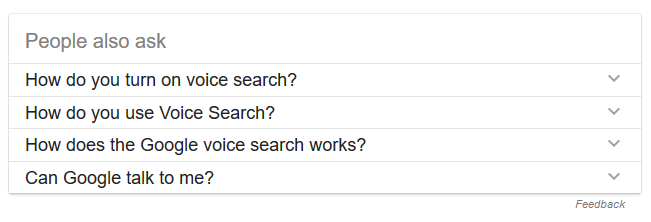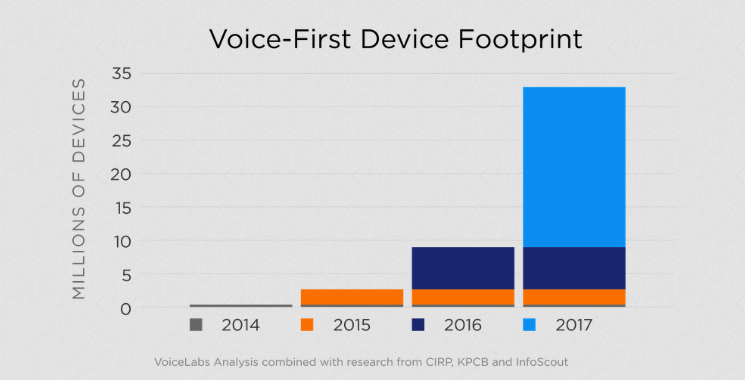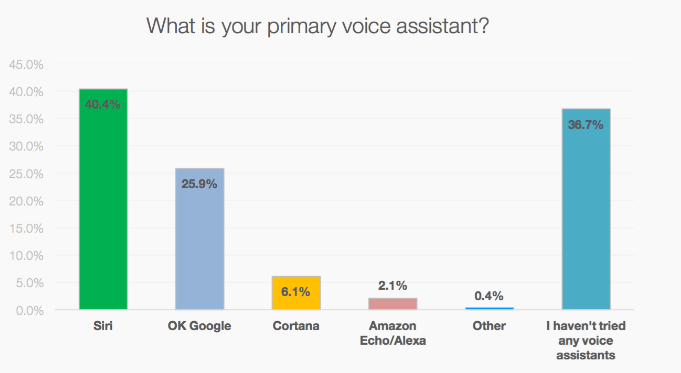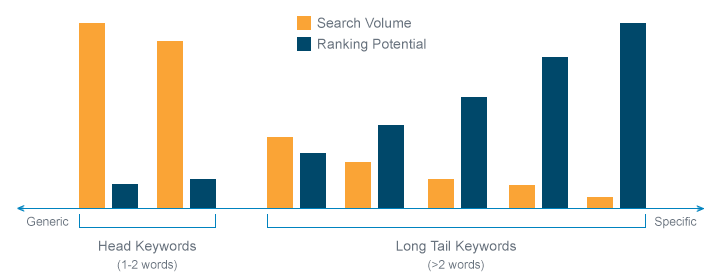Search engine optimization is always changing. And quite frankly, it can be tough to keep up with it all. Yet, despite it’s ever-changing nature, it’s your job as a website owner to monitor search engine algorithm changes so you can stay ahead of the competition and continue to keep your ranking.
Think back to a few years ago when Google made mobile friendly design an important ranking factor. Remember when everyone began to scramble to optimize their websites for mobile devices? And now, a few years later, you can bet your search rankings (and your user experiences) are suffering if your website isn’t mobile friendly.
Now think about how things are today. Artificial intelligence is taking over and becoming more advanced each year, we’re seeing devices that can cater to people’s every need.
In fact, one of the biggest things we’re seeing in the tech world today is voice recognition. As a result, website owners are planning how they’re going to handle voice search optimization for their WordPress sites. While we don’t have insight into Google it’s a pretty sure bet, in the near future voice search optimization is going to affect SEO efforts.
Today we’re going to take a quick look of the emergence of voice search technology (and how relevant it really is), as well as provide some tips you can start using right away to help with your WordPress site’s SEO, so that when voice recognition becomes the norm, you’re ahead of the curve.
The Emergence of Voice Search and Key Stats
Voice search technology is everywhere, whether you realize it or not. And, not only does voice search come with a bunch of neat features that make tech devices like Amazon’s Alexa seem really cool, it also comes with a lot of practical benefits for those surfing the internet.
Some people are still on the fence about whether voice search is really here to stay, and whether it will affect their own WordPress website.
Well, we’re here to tell you that yes, it is here to stay, and yes, it will eventually affect your WordPress website and your SEO efforts.
For instance, in 2015, 1.7 million voice-first devices shipped around the world. As of now, there are an estimated 33 million voice-first devices in circulation.
By 2020, it is estimated about 30% of all searches will be performed without a screen. And since 2016, nearly 40% of adults use voice search at least once a day.
Even Google announced that 20% of all search queries are coming from voice search. MindMeld discovered that Siri was the number one primary voice search assistant used.
And when it comes to the financial side of things, a report by Technavio estimates that by 2019, the global voice recognition market will be $601 million industry.
Lastly, Alpine.AI suggests that there are over 1 billion voice searches performed each month, making voice search a very real thing.
Impressive statistics like this are just the beginning, and are an important reminder to website owners that voice recognition is not something to ignore.
Whether you like it or not, voice search is going to begin affecting websites around the world in a big way. And if you want to maintain your high search rankings, you better start developing a strategy now.
Optimizing Your WordPress Site for Voice Search
To capitalize on the fact that more people than ever are surfing the net using voice search technology, you’re going to need to tweak your SEO efforts to cater to the type of search results that’ll pop up through a voice search.
You don’t want to miss out on a growing audience of people just because they conduct searches in a new way.
Let’s take a look at some of the ways you can adjust your overall SEO strategies. to prepare for increases in voice searches, so your website can continue to draw in traffic and succeed.
1. Embrace Google Hummingbird
In 2013, Google released an update called Hummingbird to their search algorithm. This update was designed to place more focus on natural sounding search queries (such as the ones you would speak into a voice assistant), rather than short keyword phrases. It was also created to take into consideration the context and meaning of a question, rather than just focus on the individual keyword meanings.
Of course, at the time of the update, not everyone wanted to change their entire website to match this new algorithm, partly because they didn’t realize the impact it would have on their website’s SEO.
But Google began scanning content in this new way anyway. Meanwhile, those that did begin to publish conversational content began seeing significant improvements in their search rankings.
The thing is, Hummingbird hasn’t gone away. And while that update in 2013 forced website owners to rethink their content strategies if they wanted to keep their search rankings, it’s important that publishers today continue to write content that is more conversational, natural, and meaningful for their websites to end up in search results.
It also means that future content needs to be written in a way that answers specific questions, particularly for what may be asked using a voice search.
2. Use More Long-Tail Keywords
Having a healthy mix of short- and long-tail keywords throughout your content is the best way to rank high in search results. However, as voice searches increase, it’s a good idea to begin focusing more on your long-tail keywords.
Long-tail keywords are very specific to your content and answer very specific questions. They are usually in the form of informational queries, meaning they begin with question modifiers like ‘who’, what’, ‘where’, ‘when’, and ‘why.’
On the other hand, short-tail keywords are the generic keywords everyone uses. And while short tail keywords do generate a lot of search volume, the chances of you being able to compete with the big guys on page one of the search results are pretty slim.
That’s why using long-tail keywords related to your niche throughout your content is important. To start, it helps narrow down search results performed in voice searches.
It can also boost site rankings, as seen in the image below by HitTail:
The reason long-tail keywords are so important to voice search is because when someone conducts a voice search, they usually talk to their device as though they were talking to another person. This is very different from how they would type a search query
For example, in a voice search you might say something like “where can I learn about voice search optimization?”, with the long-tail keyword being ‘learn about voice search optimization.’
If you were typing this into a search bar, you would probably use the short tail version of this and type “voice search optimization.”
Both are very good keywords, and if your content relates to either, you’ll show up in search results. But if you include the long-tail keyword in your content, in addition to the short-tail one, your chances of showing up closer to page one increase.
Need some help figuring out which long-tail keywords to use? Check out the free online tool Answer the Public. Simply enter your short-tail keyword and let the tool spit out plenty of long-tail informational query keywords for you.
The great thing about this tool is, the queries they provide are based off actual Google search results so you know what you’re seeing are actual search queries people have entered into Google before. You can then use these long-tail phrases throughout your content in an effort to boost your search rankings.
3. Include Local SEO
A lot of times, people will use their voice search assistants to find local hotspots such as restaurants, shops, or events.
If you run a website that involves the local community, and have a physical location for people to visit, try weaving in some local SEO strategies to help bump up your rankings.
Here are some tips for helping mobile searchers find you locally:
- Use keywords that describe your neighborhood or location
- Using phrases like “near me” inside title tags, meta descriptions, internal links, and anchor texts
- Add landmark references that may pop up in a search result or be referenced by a voice searcher
- Include terms like “best”, “nearest”, and “store hours” because many people will use those in voice searches
- Add office or store hours, your address, and other contact information so people can get in touch
- Claim your business on Google My Business, a free business listing tool
The more you can narrow down your content to relate to your physical location the better. That way when someone asks Siri where the best hamburger place near them is, the hamburger place you own that’s near them pops up and shows them how to come and visit.
4. Look to Increase Traffic
Beyond aiming to cater to voice searches that are undeniably happening all the time, there are plenty of other great ways to drive traffic to your site (which in turn helps boost search rankings, even for voice searches):
Compete for ‘Position Zero’
By publishing content that simply answers a question, you’re more likely to land the coveted ‘Position Zero’ in search results.
Google is going to continue to offer the most relevant content to searchers, especially if they ask a question using their voice assistant. By creating content that answers those questions, you give Google a reason to put you at the top.
Focus on Readability
The easier it is to read, scan, and understand your content, the higher your search rankings will be as search engine crawlers will be able to index your site better. Not to mention, the more relevant your content is to voice searches, the more traffic that will come to your site, and the higher you’ll rank in the future.
If you need help with making your site more readable, check out the free Hemingway Editor tool. In addition, you can have your web developer use schema.org markup to make things even easier on Google and other search engines to understand your web pages and index them in search results.
For helpful information about schema.org markup, check out this helpful guide.
Enable Google AMP
In an effort to deliver search results faster, and give mobile users a better experience, enable Google AMP on your website so people conducting mobile searches will see your site even faster.
Use the official AMP for WordPress plugin and boost the speed and performance of your mobile site instantly.
Aim to Get Your Content in Featured Snippets
Though there is no exact way to get your content into a Featured Snippet, it’s worth noting that Backlinko found that 40.7% of all voice search results were pulled from a Featured Snippet. This means you land on page one in search results if your Featured Snippet is chosen in a voice search.
In the end, voice search isn’t going to change the entire landscape of SEO as we know it today. But it will have a significant effect on your website’s search rankings in one way or another. Especially as people continue to rely on their voice assistants to conduct voice searches more and more.
Final Thoughts
Take some time to rethink your SEO strategies and integrate some voice search SEO tips and tricks. Technology is not going to stand by and wait for you to figure it all out. And you don’t want to lose what search engine rankings you have now because you failed to invest a little time into your overall SEO strategies.
Concentrate on long-tail keywords, answer more direct questions, compete for position zero and Featured Snippet spots, and most of all, continue to deliver high quality content to your loyal readers. If you do this, you’ll see that voice searches will only help you move up in rankings.
And don’t worry, if you have any questions about voice search optimization on WordPress website and its effect on your site’s SEO, we’re just a quick message or tweet away.
Other articles you may enjoy:
- WordPress Themes and Plugins for Accessibility
- 5 Nonprofits using Amazon Alexa Effectively
- 10 Things to Check for on Your Responsively Designed Website
You May Also Like

Until now, building a website for everyone has been next to impossible. Developers, struggling with ageing code and poorly constructed websites, can find it a burden to build truly accessible digital experiences. This often just comes down to time and processing constraints. But this doesn’t have to be the case.…
read more >
Summer is coming and we all know what that means: lazy afternoons at the pool, evening BBQs, the scent of sunscreen, the packing of suitcases, and the ever-growing pile of work that still has to be done. Staying productive in the summertime can be tough. After all, we want to take…
read more >







